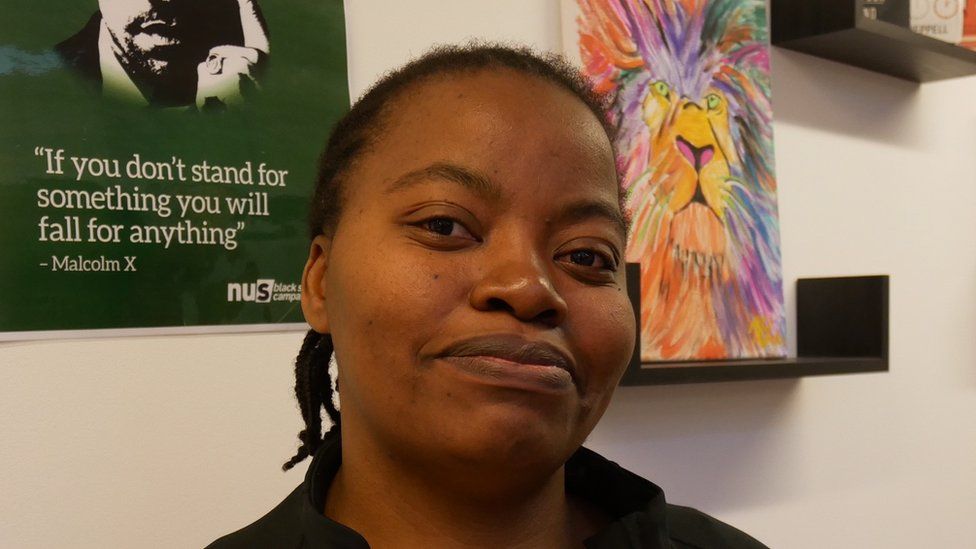ARTICLE AD BOX
 Image source, Kat Pirnak/Bureau of Investigative Journalism
Image source, Kat Pirnak/Bureau of Investigative Journalism
A South African woman has described working as a fruit picker on farms in the south of England as "slave labour".
"We weren't viewed as humans," Sybil Msezane told a House of Lords committee.
She said workers were addressed by numbers, rather than names, as if they were in prison, forced to work 18 hour days and live in overcrowded caravans.
If they complained to bosses they were threatened with deportation, the Lords horticultural committee was told.
The committee is investigating the treatment of migrant workers on British farms.
Andrey Okhrimenko, from Kazakhstan, speaking via video link, said: "If you don't work fast enough, if you don't comply with quality... they will say 'we will cancel your visa, we can send you back home to your country'.
"We had extremely bad living conditions, we had problems with working conditions. We were disrespected and manipulated."
Like Ms Msezane, he was recruited last year by an agent in his home country via an advertisement on social media and had to pay for his own airfare and visa, before being put to work on fruit farms in the south of England.
'People need work'
Ms Msezane, who is from Johanessburg, is now a care worker for an English local authority.
She told the BBC she was treated with respect in her new role, in sharp contrast to her experience last year as a seasonal agricultural worker, picking and packing strawberries for British supermarkets.
"I could not have thought that the conditions I found in 2022, in the United Kingdom, were what I found. It was beyond shocking.
"I'd spent close to, almost, £2,500 equivalent. There is no way I am going home at that point. I am here to make money. That's essentially it. So you get to work."
She had to pay rent to live in a caravan with six people of different nationalities, both men and women, who had a single shower and fridge between them.
"My country is going through a lot economically. People need work. So I would never say to people not to come on the seasonal worker visa," she told the BBC.
"Everyone who was on the scheme with me was able to support their families in different ways."
But she added: "You need to be aware that you are coming into a country where you don't have as many rights as a worker as you do in South Africa. So that can be challenging."
'Five star hotels'
Andre Okhrimenko, from Kazakhstan, said conditions on his farm were so bad several people had decided to leave and work illegally instead.
Seasonal workers were not asking for "five star hotels", he told the committee, but "employers must provide proper living and working conditions".
Emiliano Mellino, a journalist for the Bureau of Investigative Journalism, who has written a series of articles on the treatment of migrant workers, told the Lords committee some workers have been subjected to bullying and abuse.
Image source, Getty Images
Image caption,British strawberries are harvested by overseas workers
He said many take out loans to cover the costs of coming to the UK, and they also had to pay rent of up to £80 a week for their accommodation, which meant they were reluctant to speak out for fear of losing their job.
The government's official policy is to train up British workers to fill the 50,000 seasonal jobs on British farms currently carried out by migrant workers.
Before the UK left EU, most of these casual workers came from Europe.
When the current seasonal workers visa scheme was launched in 2019, it had a quota of just 2,500 places a year, with most coming from Russia and Ukraine.
It was expanded to 38,000 visas in 2022, following pressure from the farming industry, who had been forced leave crops unpicked.
The net was cast to a wider range of nationalities, including South Africa and central European countries like Kazakhstan.
The scheme is due to run until 2024, with debate raging in government over whether it should be expanded to keep food costs down to help tame inflation.
The government has authorised only a small number of recruitment companies, known as "scheme operators", to arrange seasonal worker visas.
Farmers must hire their overseas workers through those companies and must demonstrate that they are actively trying to recruit UK-based workers as well.
Scheme operators also have explicit duties to look after workers' welfare and make sure they are paid properly.
The British Growers Association has been contacted for a comment.

 1 year ago
112
1 year ago
112








 English (US) ·
English (US) ·